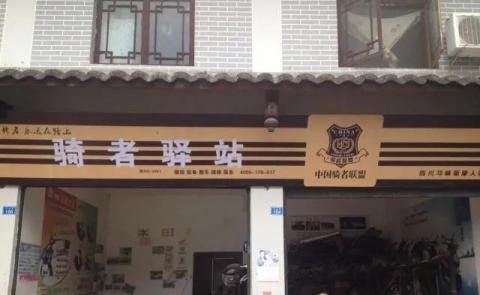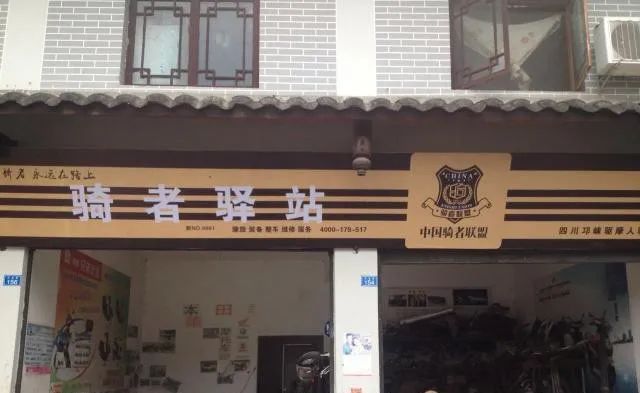

When traveling to Chengdu, eating hot pot in the early morning is a bit luxurious, not to mention that it’s not even open yet.
So I ate Guokui, which is as good as Xi'an Roujiamo.
As the saying goes, everything is included in the pie. A Guokui and a bowl of rice rolls are a bit filling.
Taking advantage of the heat, we rode straight to Yajiang River.
Unable to resist the persuasion of all kinds of travel friends, I bought a plate of glucose to resist high reflexes. Although I didn’t really use it in the end, I was still prepared.
The staff at the pharmacy heard that I was going to Mount Everest and Namtso, and they kept recommending oxygen packs to me. When asked about the price, I still chose to believe in my adaptability to travel all over the world.

By the way, I haven’t posted the itinerary yet, so this is probably the route this time.
There are three accommodation sites at an altitude of over 5,000 meters. But oxygen bottles that are hundreds of bottles in size will indeed make things worse for families who are not already wealthy. Bagged oxygen takes up too much space. You can only believe in yourself.

Not far after crossing the Yajiang River, I passed an iron bridge. Although I don’t know its origin, looking at the shining red stars on the bridge, it should be a story about the Red Army’s Long March.
Fill up the gas at the gas station and move on, the weather is getting hotter and hotter.
While waiting for the wrong bus on a bad road, I saw many flatbed trucks with Su C license plates, honking their horns to greet each other. It was like a fellow villager meeting a fellow villager.
On the way, I met all kinds of people entering Tibet. There are self-driving ones, motorcycle tours, cyclists, hikers and cart-pullers.
In fact, I particularly admire the people who pull the carts. Although live broadcasting can make a lot of money, I have a hard time riding a motorcycle up many passes. I really don’t know how they pull such a heavy flatbed up.
Although many anti-counterfeiters found that they had a team with guaranteed cars to help them go up the mountain, but I also met a few who were just pulling cars. 30 kilometers a day, just over a month ago from Chengdu to Yajiang. What a tough boy.
Many friends asked me whether this kind of car can go to Tibet. In fact, there are no buses that can’t get to Lhasa, there are only people who can’t get to Lhasa.
For example, these ruthless people rode shared bicycles to Lhasa.







Just as I was about to leave, I met a motorcycle friend at the door and asked me to come in with him. He also said something that I couldn't refuse: "We've come all the way." So I willingly paid for the ticket, which was considered a feeling. Let’s take a look at the magnificent events when the Red Army flew to seize the Luding Bridge and forcibly crossed the Dadu River.
It’s really a miracle. “Everyone has come.” It’s these four words that make countless Chinese pull out their wallets at the entrances of various attractions, and beat their chests and feet at the exits and curse them for being cheating.
Fortunately, the ten yuan I spent was not a loss at all.
Went out for lunch and went straight to Kangding.

This place is famous for its love songs, but unfortunately I didn’t hear folk songs. Instead, I heard complaints from several Xi’an motorcycle friends at the observation deck.
It turned out that they were digging a layer of the road for road construction. They were driving too fast without paying attention, and the wheel hubs were deformed.
What do you say about drag racing on the Sichuan-Tibet line? Wish yourself the best of luck, brother.



Before heading towards Kangxi, we passed the first pass of the Sichuan-Tibet Line - Zheduo Mountain with an altitude of 4298 meters.


The snow on Zheduo Mountain has not yet melted. Many people stopped to take pictures at the pass and the road was quite crowded, so a few self-driving cars were scrapped and sat on the roadside regretfully waiting for tow trucks. There are more people who are squatting on the ground due to high altitude and unable to walk.


After crossing the pass, there was a long downhill slope. I saw a motorcycle friend squatting on the roadside and stopped to ask.
He was wondering why there was no altitude sickness at the top of the mountain, but he felt dizzy when walking to a lower altitude.
I pretended to be serious and said that this was not a high-reflex reaction. You were intoxicated by oxygen too quickly at the altitude. Just take a break and you'll be fine.
After saying that, I brushed off my clothes and left in his surprised eyes, hiding my merit and fame.


When I arrived at Xinduqiao, I was a little hungry, so I did a little post-posting and then headed to the legendary photography corridor.
Fortunately, after more than ten days of rain, it was a sunny day in Xinduqiao today.
Looking from afar, it is said that the King of Shu Mountain only reveals its innocent appearance for more than ten years a year - Gongga Snow Mountain.


Seeing such scenery, this trip to Sichuan and Tibet was not in vain.
It was getting late, and we were galloping all the way to Yajiang River.
On the road, we encountered a police car that was suddenly convulsed. A policeman used an apple to hit a yak blocking the road. As a result, I, who was following his car, was overturned by the frightened yak.
The most worrying thing along the way happened.
Fortunately, the cow was not injured. Because of the slow speed of the car, I only fell over and was not seriously injured.
Or else it was like the two guys from Chengdu who were riding BMWs and big waterfowls that I met in the afternoon, and the car hit them before they even started.
These two buddies were also amazing. They were driving so fast that one of them hit a yak one behind the other. It's like it's been discussed.
Nothing serious happened to the man, he fell on the grassland, but the car was broken and the cow died. The two paid money and waited for a tow truck. They woke up at the beginning of the dream and had no choice but to go home.

I got up and stretched my muscles on the roadside without any discomfort. Cattle were also driven off the road by Tibetans.
Continue to set off, pass the 4412-meter Gaoersi Mountain, and go downhill all the way to the Yajiang River, which is only 2530 meters above sea level.

I stopped the car and recalled it carefully. More than ten kilometers past the county seat was the famous Yajiang Three Sisters Reception Station in the motorcycle bar.
So we crossed the bridge and continued uphill.


Looking around, there was no one around. So I solved my next personal problem at the road sign of G318 National Highway 3000. By the way, I took pictures of all kinds of messages doubting life.
The Yajiang Three Sisters Reception Station is indeed well-deserved, with a strong Tibetan style, and the yard is full of motorcycles and bicycles. When applying for accommodation, I was given the price of a room with multiple people for sharing a bed in a standard room, including dinner and breakfast.
Fortunately, I was the last guest to arrive that night, so I stayed in a standard room by myself, which felt like I saved hundreds of millions.
Dinner was a sumptuous buffet. Looking back now, it was the best meal I had along the way.

After having a delicious meal, I went out and saw Su B and Su D’s motorcycles parked in the yard.
In line with the self-consciousness of people from northern Jiangsu, I did not recognize my hometown fellows from southern Jiangsu, but simply said hello to fellow riders.



Sitting on a bamboo chair, I listened to the live broadcast of a couple who have been riding bicycles around China for three or four years. The man is a Tibetan and can sing folk songs well. Listening to them communicate with several riding friends solved a big confusion for me on the road.
I asked why so many cyclists don’t have any luggage. It turns out that now they provide luggage check-in, and a car will deliver your luggage to your booked accommodation.
Thinking about our riding back then, we really relied on our brute strength to pedal hard while carrying tents, sleeping bags, pots and pans.






